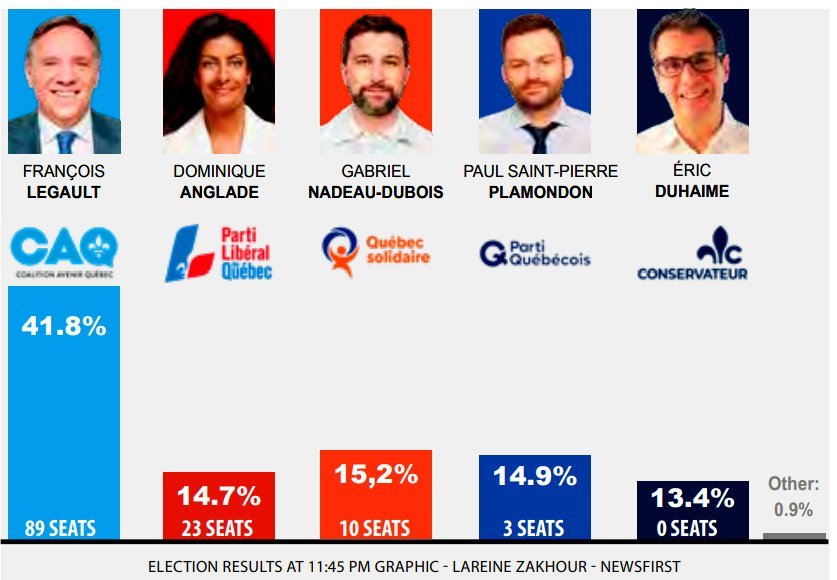Division of opposition parties boosted CAQ
(NEWSFIRST) It took only eight minutes after the polls closed for tva host Pierre Bruneau to say the magic words: “If the trend continues, the next CAQ government will be in the majority.” A result that will not surprise anyone, in light of the many opinion polls that gave the winning CAQ team even before the start of the electoral marathon.
As soon as the first results of the advance poll were announced, the CAQ’s advances were such that the election of several candidates from François Legault’s party was confirmed.
The Coalition avenir Québec (CAQ) won the election and led another majority government. François Legault’s party, which won the 2018 election, won a second consecutive term. For its part, the Quebec Liberal Party (QLP) will return to the benches of the official opposition.
This is the first time since 2008 that a political party has won two general elections in a row. And it is also the first time since 1998 that Quebecers have entrusted the same party with two successive majority mandates.
The pollsters will therefore have seen it right: the CAQ had been given favorite from the beginning of the campaign, on August 28.

The government will once again be led by François Legault.
And he will in all likelihood count on an even larger team than the 76 deputies who sat for him at the time of the dissolution of the National Assembly, starting with the 25 members of his Cabinet, all of whom will be back in Parliament.
The CAQ also elected several star candidates, including Sonia Bélanger (Prévost), Martine Biron (Chaudière-Appalaches), Kariane Bourassa (Charlevoix–Côte-de-Beaupré), Pascale Déry (Repentigny), Bernard Drainville (Lévis), Christine Fréchette (Sanguinet) and Suzanne Roy (Verchères).
In Duplessis, Kateri Champagne Jourdain was elected, who became the first Indigenous woman in history to enter Parliament.
Weakened opposition
The evening was much more difficult for the other formations, whose support is all around 15%.
For the PLQ, this is the worst score in its history. Its support had never fallen as low as in 2018, at 25%. That being said, the party should retain its place on the opposition benches with about twenty MPs, or even more.
Its leader, Dominique Anglade, was re-elected. She gave the signal tonight that she intends to remain in office, despite the retreat of her party. “In the coming days, months, years, I will deploy the same energy, the same conviction, the same ambition, she assured. The work has begun and must continue.”
The Parti Québécois (PQ) is also at a low level, with the party never winning less than 17% of the vote in 2018. However, its leader, Paul St-Pierre Plamondon, was re-elected, as were Pascal Bérubé (Matane-Matapédia) and Joël Arseneau (Îles-de-la-Madeleine).
Québec solidaire (QS), for its part, should end the evening with a score similar to that of 2018 in terms of votes and seats (about ten). His two spokesmen, Gabriel Nadeau-Dubois, in Gouin, and Manon Massé, in Sainte-Marie–Saint-Jacques, were easily re-elected.
Finally, the Conservative Party of Quebec (PCQ) was on track to elect no MPs tonight. Defeated in Chauveau, its leader, Eric Duhaime, has however promised to be back on the ranks in four years.
Calling on his activists not to be too pessimistic, the former radio host recalled that Qs won only 4% of the vote in the 2007 elections, the first in which the party participated.
Trudeau congratulates Legault
The Prime Minister of Canada, Justin Trudeau, quickly issued a statement congratulating François Legault, saying he looks forward to continuing to work with [him] to address the challenges that matter to Quebecers and all Canadians.
These include fostering the growth of the green economy, fighting climate change, finding solutions to labour shortages, making life more affordable, fostering the creation of affordable housing, investing in infrastructure and building a clean and prosperous future, he said.
Ontario Premier Doug Ford also hailed the victory of his friend François Legault. Let’s continue to build deeper ties between our two provinces and strengthen the economic ties between us that create well-paying jobs,” he tweeted Monday night.
Voters turnout
Voter turnout was only 66.13%, which is lower than the 66.45% in the 2018 Elections. At 5:30 p.m., the turnout was 44.63%. Advance voting reached a record high this year, with more than one in five voters (22.92%) going to the polls before election day. In 2018, the turnout at the end of the evening was 66.45%, which was then the second lowest result in history.
The record turnout belongs to the Parti Québécois election in 1976, when 85.27% of voters went to the polls.
No less than 880 people were in the ranks this year, or about seven candidates per constituency.
These elections put an end to a gruelling 36-day campaign. The next few weeks are obviously much quieter than the previous ones. The MPs elected today are expected to be sworn in in two or three weeks. In 2018, the Council of Ministers was presented 18 days after the elections.














